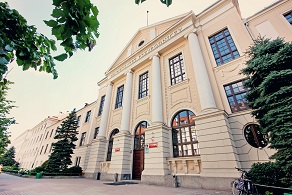|
Wrocław University of Environmental and Life Sciences is a State Higher Education School which has been operating as an independent university since 1951. It employs more than 1,600 employees, including 700 academic teachers and more than 250 professors and habilitated doctors. |
 |
Wrocław University of Environmental and Life Sciences is PN-EN ISO 9001:2009 certified. It was awarded the Golden Emblem in the QI SERVICES category, Polish Award of Intelligent Development and Grand Prix for the Biocervin project at the Intelligent Development Forum. The university also has the prestigious Human Resources Excellence in Research logo awarded by the European Commission.
Current research tasks related to the monitoring of the Earth's surface and atmosphere include:
• permanent calculation of GNSS data from the station network in Poland (270 stations) to determine meteorological parameters;
• conducting calculations for the needs of GNSS meteorology for stations in Lithuania (30 stations) using the own computing infrastructure;
• conducting permanent GNSS observation stations (GPS+GLONASS+Galileo+Beidou+QZSS) "WROC" in Wrocław, belonging to international networks of IGS (International GNSS Service) and EPN (EUREF Permanent Network) as well as the national ASG-EUPOS network. Data from this station are used to preserve the world, European and national geodetic reference system, as well as to study the atmosphere (troposphere and ionosphere);
• supervising the calculation of the tropospheric status from GNSS data in near real-time for the Victoria area in Australia (data are provided on an ongoing basis to the Australian Bureau of Meteorology);
• control of data storage systems with a total capacity of 100TB, as well as databases (MsSQL and MySQL) enabling efficient storage and provision of meteorological products;
• processing laser distance measurements to geodetic and navigation satellites and running a website allowing for analyses of laser observation residua to Galileo, GLONASS, BeiDou and QZSS systems;
• processing of laser scanning point clouds and UAV sensor data for the needs of building precise Digital Terrain Models, mass movement detection, and surface deformation modelling;
• development and implementation of Spatial Information Systems, including GIS 3D within the "GISLab" laboratory.
The project "EPOS - European Plate Observing System" will be implemented at the Institute of Geodesy and Geoinformatics at The Faculty of Environmental Engineering and Geodesy, Wrocław University of Environmental and Life Sciences.
As a partner, Wrocław University of Environmental and Life Sciences will implement tasks related to the construction of the NRT/RT GNSS Analysis Centre (task 5), the integration of the GGOS-PL infrastructure with the infrastructure to be developed (task 8), construction of specialised test sites for integrated observations of geodynamic processes on mining and post-mining areas in the Upper Silesian Coal Basin (task 9) and the development of a platform integrating data on functionalities of GIS 3D systems (task 10).





